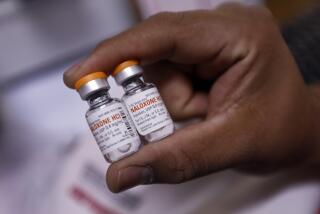U.S. Approves 1st New Drug to Treat Alcoholism in 47 Years : Addiction: Naltrexone blocks cravings for alcohol and the pleasure of getting high. Three-fourths of users in clinical test avoid relapses.
- Share via
The first new drug in 47 years to treat alcoholism has been approved by the U.S. Food and Drug Administration, the National Institute on Alcohol Abuse and Alcoholism announced Monday.
Unlike Antabuse, the currently prescribed drug that makes the user severely nauseated when he or she drinks alcohol, naltrexone works by blocking both the craving for alcohol and the pleasure of getting high.
“This is the beginning of a new era . . . in alcoholism treatment,” said Dr. Enoch Gordis, director of of the national institute, which funded testing of the drug. “This is not a ‘magic bullet,’ but naltrexone promises to help many patients in their struggle against a chronic relapsing disease.”
Results from an ongoing clinical trial to be released today at a New York news conference show that, when combined with conventional behavior modification, naltrexone allows as many as three-quarters of alcoholics to avoid a relapse, compared with fewer than half of those who received counseling alone.
“(We) now have a novel medical approach available that significantly increases abstinence rates and seems to reduce alcohol craving,” said Dr. Joseph Volpicelli of the University of Pennsylvania.
Alcoholism is by far the most common drug abuse problem in the United States. Nearly 11 million Americans suffer from alcoholism, and as many as a third of all Americans are touched by it through a close relative or acquaintance. At least 100,000 deaths are associated with alcohol abuse each year, either from cirrhosis of the liver or from accidents caused by intoxication.
A recent government report estimated the yearly costs of alcoholism at $98.6 billion--about a third of it in direct medical costs and the remainder in lost earnings.
About 1 million American alcoholics seek help for their problem each year, but many drop out of treatment quickly, in part because their craving for alcohol is so great that they are unable to resist it. Of those who stay in the programs, more than half typically suffer a relapse within a few months.
Naltrexone was developed by the DuPont Co., now the DuPont Merck Pharmaceutical Co., for the treatment of heroin abuse and approved for that use in 1984. It targets the same receptors in the brain that produce feelings of pleasure when heroin or other opiates bind to them, but does not itself produce a “high” and is not habit-forming.
Although alcohol does not bind to those brain receptors, studies in animals and now humans show that naltrexone works equally well against it.
Patients who received the drug reported that it reduced the craving for a drink. And because it reduced pleasurable sensations from alcohol, those patients who had a drink or two during recovery were much less likely to suffer a complete relapse.
Two clinical trials reported two years ago studied 70 and 104 alcoholics, respectively. Volpicelli and his colleagues reported that, after three months, only 23% of those who received naltrexone and behavioral therapy had suffered a relapse, compared to 54% of those who received a placebo and counseling.
Dr. Bruce Rounsaville and his colleagues at the Yale University School of Medicine, who used stricter criteria for defining a relapse, found that 39% of the naltrexone patients relapsed, compared to 79% of those who received only counseling.
The FDA actually approved the drug New Year’s Eve, but the announcement escaped notice during the holidays.
More on Medicine (Southland Edition, A17)
* Articles on the latest medical research covering everything from cholesterol to cancer are available on the TimesLink on-line service. Sign on and “jump” to keyword “medicine.”
Details on Times electronic services, B4
More to Read
Sign up for Essential California
The most important California stories and recommendations in your inbox every morning.
You may occasionally receive promotional content from the Los Angeles Times.













